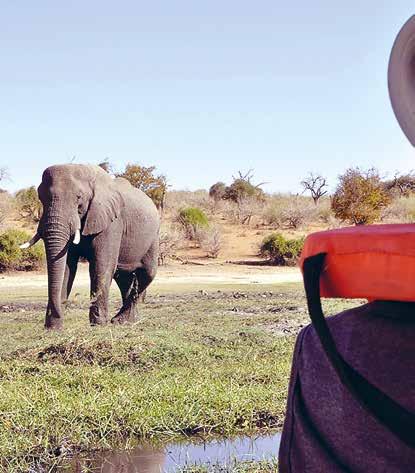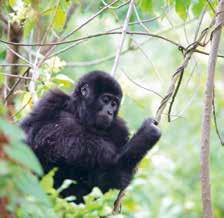
1 minute read
Wildlife conservation
By visiting many of the parks, reserves, and conservancies across Africa, you can help support wildlife conservation and the local people who live nearby. I’d always recommend choosing trips where your money supports local jobs, and helps fund schools, health clinics and conservation efforts. Some wildlife trips even offer you the chance to get directly involved, such as tracking and tagging rhinos, or monitoring animal populations.
One of the world’s most unforgettable wildlife experiences is to get eye-to-eye with mountain gorillas, observing the powerful silverbacks and their families, including tumbling infants, as they feed, groom, and relax in their rainforest home. Mountain gorillas are an inspiring conservation success story. Previously thought likely to go extinct, their numbers have steadily increased, with 1,063 gorillas counted in the most recent 2018 census. The IUCN has relisted them as Endangered, rather than Critically Endangered. That’s down to conservation efforts, much of which is funded by gorilla tourism, which also benefits local communities living alongside the gorillas’ habitat.
Rwanda and Uganda are the places to find gorillas, with safety issues currently in the Democratic Republic of Congo.

Also in Rwanda, African Parks is helping revive Akagera National Park, a wetlands area, where reintroduced white and black rhino, lions, leopards, and more than 100 elephants are doing well in the park that was previously on its knees. The same goes for Nyungwe National Park which now has chimps and 12 other primate species, as well as forest and canopy walks, and more than 300 bird species.
The two restored parks create a circuit for tourists visiting Volcanoes National Park’s gorillas.
Perhaps Africa’s greatest wildlife restoration project though, is Gorongosa National Park in Mozambique. Wildlife was decimated during the country’s civil war, but, after a major conservation effort began in 2008, there are now more than 100,000 animals in the forested hills and open savannah, including reintroduced lions, elephants, African wild dogs, and hyena, as well as reforestation projects and sustainable agriculture, such as coffee.
There’s no doubt that the African wilderness is unlike anything you’ll have ever experienced before. Your first sighting of a wild animal, and the many sightings that follow, will stay with your forever. An African safari is a once-in-alifetime experience that is likely to become the habit of a lifetime. There will always be more to discover.
Getting ready for a safari? Have a look at our packing suggestions: exploreworldwide.ca/safari-packinglist
Graeme Green Journalist, photographer, and editor @graeme.green










